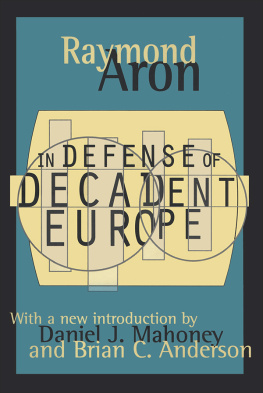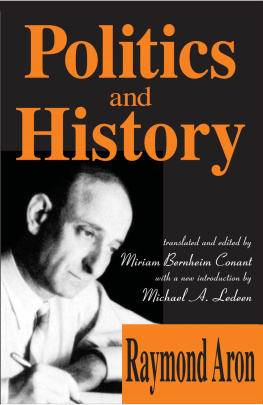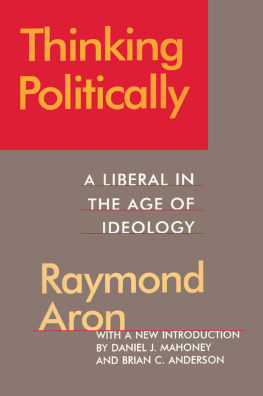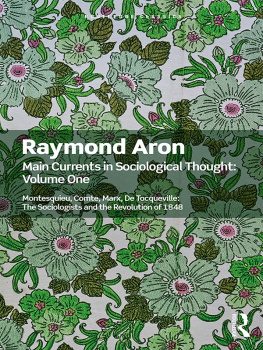Raymond Aron - The Opium of the Intellectuals
Here you can read online Raymond Aron - The Opium of the Intellectuals full text of the book (entire story) in english for free. Download pdf and epub, get meaning, cover and reviews about this ebook. publisher: Transaction Publishers, genre: Politics. Description of the work, (preface) as well as reviews are available. Best literature library LitArk.com created for fans of good reading and offers a wide selection of genres:
Romance novel
Science fiction
Adventure
Detective
Science
History
Home and family
Prose
Art
Politics
Computer
Non-fiction
Religion
Business
Children
Humor
Choose a favorite category and find really read worthwhile books. Enjoy immersion in the world of imagination, feel the emotions of the characters or learn something new for yourself, make an fascinating discovery.

- Book:The Opium of the Intellectuals
- Author:
- Publisher:Transaction Publishers
- Genre:
- Rating:5 / 5
- Favourites:Add to favourites
- Your mark:
- 100
- 1
- 2
- 3
- 4
- 5
The Opium of the Intellectuals: summary, description and annotation
We offer to read an annotation, description, summary or preface (depends on what the author of the book "The Opium of the Intellectuals" wrote himself). If you haven't found the necessary information about the book — write in the comments, we will try to find it.
The Opium of the Intellectuals — read online for free the complete book (whole text) full work
Below is the text of the book, divided by pages. System saving the place of the last page read, allows you to conveniently read the book "The Opium of the Intellectuals" online for free, without having to search again every time where you left off. Put a bookmark, and you can go to the page where you finished reading at any time.
Font size:
Interval:
Bookmark:
The Opium of the Intellectuals
Books by Raymond Aron Published by Transaction
De Gaulle, Israel and the Jews
In Defense of Decadent Europe
Main Currents in Sociological Thought
Volume 1: Montesquieu, Comte, Marx, Tocqueville, and the Sociologists and the Revolution of 1848
Main Currents in Sociological Thought Volume 2: Durkheim, Pareto, Weber
The Opium of the Intellectuals
Peace & War: A Theory of International Relations
Politics and History
Thinking Politically: A Liberal in the Age of Ideology
The Opium of the Intellectuals
Raymond Aron
With a new introduction by Harvey C. Mansfield
Foreword by
Daniel J. Mahoney and Brian C. Anderson

Transaction Publishers
New Brunswick (U.S.A.) and London (U.K.)
Eighth printing 2009
New material this edition copyright 2001 by Transaction Publishers, New Brunswick, New Jersey. Copyright 1957, 1962 by Raymond Aron. Copyright 1955 by Calmann Lvy.
All rights reserved under International and Pan-American Copyright Conventions. No part of this book may be reproduced or transmitted in any form or by any means, electronic or mechanical, including photocopy, recording, or any information storage and retrieval system, without prior permission in writing from the publisher. All inquiries should be addressed to Transaction Publishers, RutgersThe State University of New Jersey, 35 Berrue Circle, Piscataway, New Jersey 08854-8042. www.transactionpub.com
This book is printed on acid-free paper that meets the American National Standard for Permanence of Paper for Printed Library Materials.
Library of Congress Catalog Number: 00-056795
ISBN: 978-0-7658-0700-7
Printed in the United States of America
Library of Congress Cataloging-in-Publication
Aron, Raymond, 1905
[Opium des intellectuals. English]
The opium of the intellectuals / by Raymond Aron ; with a new introduction by Harvey C. Mansfield and a foreword by Daniel J. Mahoney and Brian C. Anderson.Augmented ed.
p. cm.
Includes index.
ISBN 0-7658-0700-9 (pbk. : alk. paper)
1. Intellectuals. 2. Communism and intellectuals. 3. Right and left (Political science) 4. FranceIntellectual life. 5. Ideology. I. Title.
HM728.A7613 2000
305.5'52'0944dc21 00-056795
Religion is the sigh of the creature overwhelmed by misfortune, the sentiment of a heartless world, and the soul of soulless conditions. It is the opium of the people.
KARL MARX
Marxism is undoubtedly a religion, in the lowest sense of the word. Like every inferior form of the religious life it has been continually used, to borrow the apt phrase of Marx himself, as an opiate for the people.
SIMONE WEIL
FOREWORD TO THE TRANSACTION EDITION
THE OPIUM OF THE INTELLECTUALS is the sixth book by Raymond Aron to be published by Transaction Publishers and the fifth in the "Aron series" inaugurated with the republication of In Defense of Decadent Europe in 1996. The series' aim is to make available Aron's principal writings, with new introductions that highlight their continuing relevance and, where appropriate, with additional materials that clarify the intention of the original works.
The publication of the new Transaction edition of The Opium of the Intellectuals is a particularly significant moment for the series. The Opium of the Intellectuals (1955) is undoubtedly Aron's most famous workincredibly, however, it has been out-of-print for yearsthough it remains better known than read. Even sympathetic critics too often pigeonhole it as a skeptical assault on political rationalism or as a complacent defense of "the end of ideology." Few commentators have studied it with sufficient care to observe that its skepticism is aimed not at truth, but at the nihilism that propels ideological fanaticism in our age. Aron's "skeptical" assault on the myths of the left, the proletariat, and the revolution, and his philosophical dissection of "the idolatry of history," are at the service of restoring political judgment to its rightful place as the guardian of the human world. In his introduction to the present volume, Professor Harvey Mansfield of Harvard University highlights both Opium's remarkable contribution to clear thinking during the Cold War and its permanent contribution to understanding the intellectual foundations of non-utopian thought and action. This edition also includes a 1956 text by Aron, "Fanaticism, Prudence, and Faith," that responds to the critics of the original edition of The Opium of the Intellectuals and illuminates the Aronian understanding of political judgment. This text is Aron's magisterial response to the efforts by Sartre and other French intellectuals to fuse Marxist historicism and existentialist commitment in a way that abandons any concern with political moderation and prudence. In it Aron supplements and explains the intention of The Opium of the Intellectuals, and makes clear that his own conservative-minded liberalism is not rooted in radical skepticism about principles per se but in a legitimate skepticism about "schemes, models and Utopias." As Mansfield makes clear in his introduction, Aron's powerful critique of the fusion of Marx and Nietzsche, of "doctrinairism" and "existentialism," in the thought of his time continues to speak to the irresponsibility and incoherence of "postmodernist" thought in ours.
It is fitting for us to close with an expression of thanks to those who have made this series possible and have contributed to its success. To begin with, we owe a debt of gratitude to Transaction's Irving Louis Horowitz, who has been a constant source of encouragement from the beginning, and to Dominique Schnapper, Aron's daughter and literary executrix (and a distinguished scholar in her own right) who has given us her enthusiastic support along the way. Thanks also to Elisabeth Dutartre of the Centre de Recherches Politiques Raymond Aron for invaluable editorial assistance over the years and to Pierre Manent and Harvey Mansfield for bringing their wisdom to bear on Aron's work.
Daniel J. Mahoney
Brian C. Anderson
September 1999
INTRODUCTION TO THE TRANSACTION EDITION
RAYMOND ARON'S great polemic, The Opium of the Intellectu als, was published in 1955 during the Cold War. It is a leading document in that war, which was fought with words as much as arms. The war with arms was between two superpowers and their allies, but the Cold War of words was fought mainly within the West, and the central battlefield was Paris. The question was whether the West would sustain its will and hence its efforts in arms, or would succumb to the doubt and self-criticism of its intellectuals, many of whom wanted, or behaved as if they wanted, the other side to win.
The most advanced of these intellectuals, Jean-Paul Sartre and Maurice Merleau-Ponty, were Aron's particular targets in this work. Americans owe Raymond Aron a great debt for a courageous deed in publishing it, a deed that was also a stroke of strategy against the enemy in his heartland. For however little courage there may seem to be in the act of writing a book, and however minor the consequences may seem to be of what intellectuals in Paris happen to believe, one should not underestimate the benefits gained when Aron took the field. The good sense of non-philosophers needs to be protected against bad philosophy even when it goes over their heads, for there are many, especially among the young, who will be impressed with such high-sounding doctrines as existentialism and phenomenology, especially when combined with the moral content and fueled by the passionate hatred characteristic of Marxism. Moreover, Aron did not dismiss these doctrines with a superiority of his own; he was as far from wishing to demean philosophy as he was from condescending to the good sense of the people. He carefully weighed the arguments of the intellectuals he opposed. While denouncing the myths of the Left, the revolution, and the proletariat, he furnishes evidence of error and exposes weak nesses of reasoning that amply reveal those ideas to be the myths that he calls them. Of course, he could not entirely discredit or face down those he proved to be enemies of liberty, since the latter were supported by the dominant trends of thought in the West, but he stood up to them. He let others see that they could be opposed, refuted, and then deservedly and successfully mocked.
Font size:
Interval:
Bookmark:
Similar books «The Opium of the Intellectuals»
Look at similar books to The Opium of the Intellectuals. We have selected literature similar in name and meaning in the hope of providing readers with more options to find new, interesting, not yet read works.
Discussion, reviews of the book The Opium of the Intellectuals and just readers' own opinions. Leave your comments, write what you think about the work, its meaning or the main characters. Specify what exactly you liked and what you didn't like, and why you think so.







